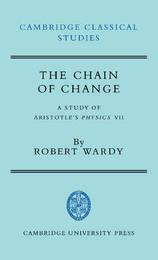
|
The Chain of Change: A Study of Aristotle's Physics VII
Hardback
Main Details
| Title |
The Chain of Change: A Study of Aristotle's Physics VII
|
| Authors and Contributors |
By (author) Robert Wardy
|
| Series | Cambridge Classical Studies |
|---|
| Physical Properties |
| Format:Hardback | | Pages:356 | | Dimensions(mm): Height 216,Width 140 |
|
| Category/Genre | Western philosophy - Ancient to c 500
Philosophy of science |
|---|
| ISBN/Barcode |
9780521373272
|
| Classifications | Dewey:500 110 |
|---|
| Audience | | Professional & Vocational | |
|---|
|
Publishing Details |
| Publisher |
Cambridge University Press
|
| Imprint |
Cambridge University Press
|
| Publication Date |
27 September 1990 |
| Publication Country |
United Kingdom
|
Description
The Chain of Change is the first full-scale philosophical commentary devoted to Aristotle's Physics VII, in which Aristotle argues for the existence of a first, unmoved cosmic mover. This study systematically considers the major issues of the book, and argues for the fundamental importance of Physics VII in our understanding of Aristotelian cosmology and natural science. Physics VII is extant in two versions, and therefore poses special editorial problems. For this reason one of the features of Dr Wardy's study is the provision of an improved text and translation in both versions. The author's comprehensive comparison of their merits, philosophical and philological, has a significant bearing on our understanding of the nature and evolution of the Aristotelian corpus. The second part of the book is devoted to critical examination of the argument, including one of the most elaborate and challenging in the entire Aristotelian corpus. Throughout, the author concentrates on those points where Aristotle diverges most sharply and provocatively from contemporary presumptions in philosophy and natural science. This book will be of interest to historians of philosophy, science and mathematics.
Reviews'... an unfolding series of interrelated and extremely vigorous arguments which makes great demands on the reader but which more than repays the effort.' The Classical Review
|